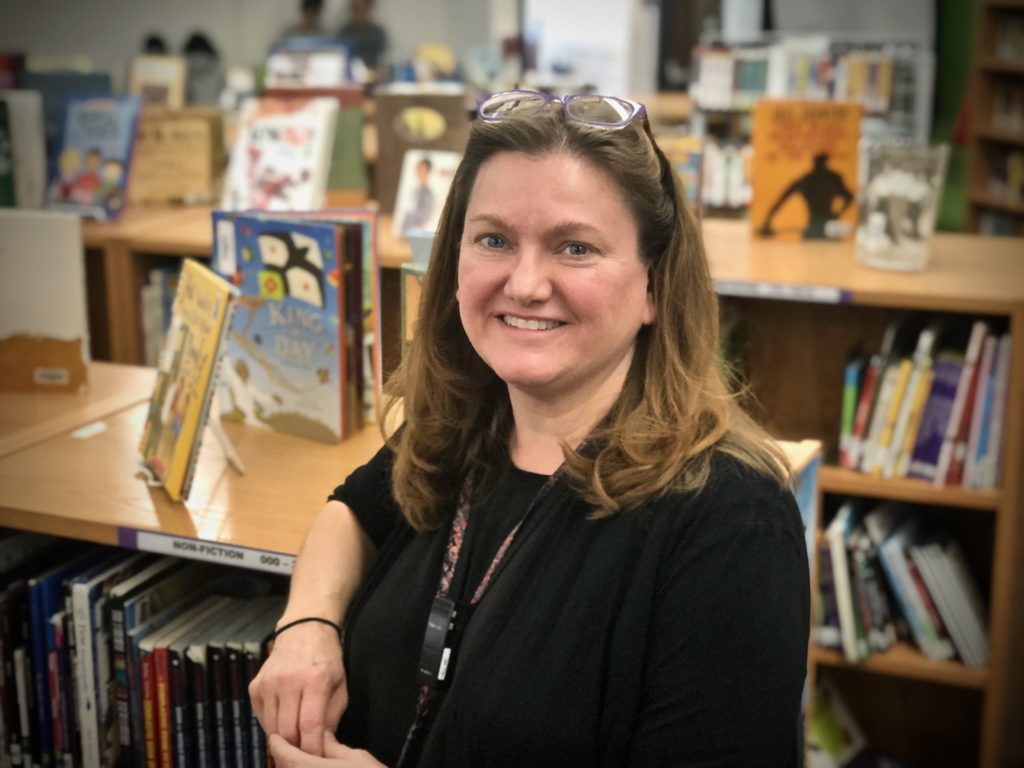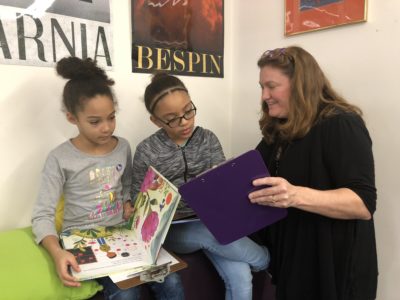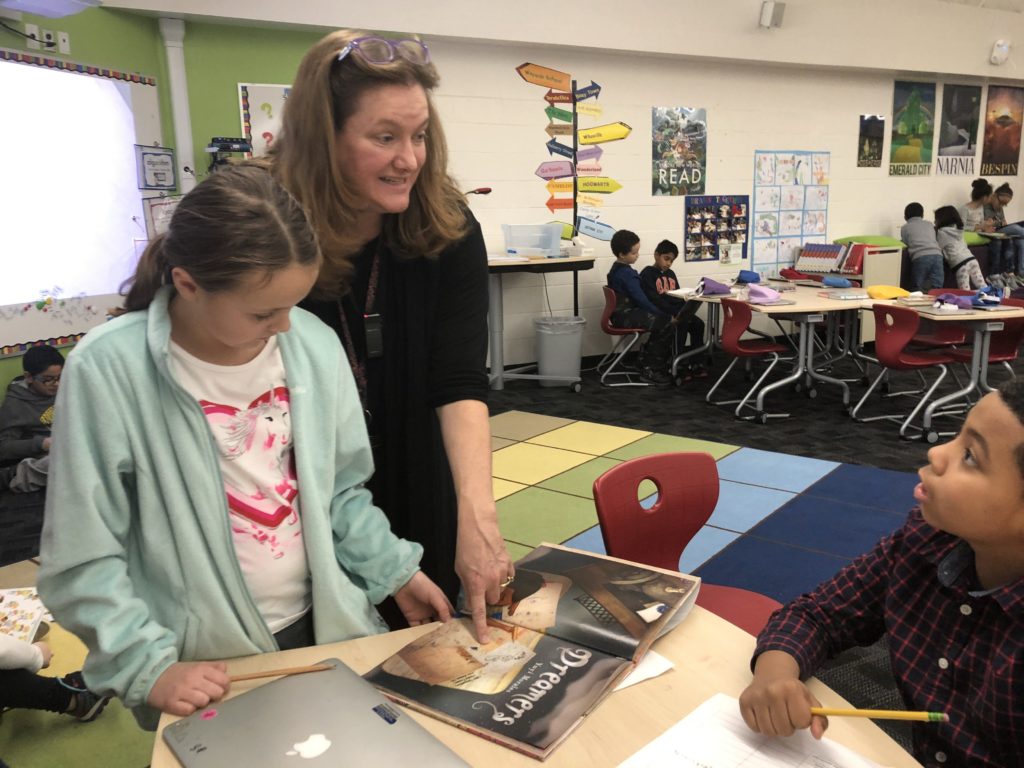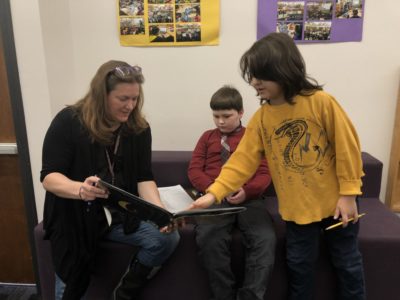

By Jo Mathis/AAPS District News Editor
Christine Woelmer grew up attending the Ida Public Schools in southeast Michigan. Her father was an English professor at Monroe County Community College, and her mother taught English and algebra at Ida Middle School.
She earned a bachelor’s degree in English at the University of North Carolina at Chapel Hill, a master’s in English education at the University of Michigan, and a master’s in library science degree at the University of North Texas.
Woelmer started her career teaching English at Walled Lake Western High School but took some time off when her oldest daughter was born and her family moved to the Milan area. For several years she enjoyed volunteering in her daughters’ classrooms while teaching occasional reading and English classes at Owens Technical College and Concordia. She earned an MLS degree in 2010 from the University of North Texas and returned to work full time, first as a librarian at New Beginnings Academy and a technology specialist at Fortis Academy, and finally as a school librarian at Allen Elementary.
She and her husband, Mike, live in Milan. Their daughters, Elizabeth and Julia, attend the University of Michigan in Ann Arbor. They have two energetic German Shorthaired Pointers who love running and Frisbee.
The Woelmers have a small camper and enjoy exploring. They are slowly working toward the goal of visiting all of the national parks, and have spent summers in Oregon, Maine, and everywhere in between. One of the family’s favorite trips was in the southern Utah parks, particularly the Zion/Bryce/Monument Valley areas, where they completed two of their favorite hikes in Zion (The Narrows and Angels Landing).
In the video above, third graders had just finished a unit about the children’s book awards (Caldecott, Newbery, Coretta Scott King), and now that they had a good idea of how to evaluate picture books, they were preparing to participate in March Book Madness (MBM). This is a celebration of books set up as a bracketed book contest throughout March and is open to students around the world. Students first read all 16 choices, and then vote once a week until those choices are narrowed to a final winner. The students were taking a first look at this year’s competitors.
What was always written on your report card in grade school? I loved school, and my report cards always reflected that. The one thing that stands out is the time my Kindergarten teacher wrote “conference requested” because we had been studying farm animals and I always colored my cows purple. She was worried I did not understand the difference between real and make-believe. My parents had to explain that I spent a lot of time on my grandparent’s dairy farm, and while I was very familiar with cows, I simply thought they would be more fun if they were purple.

What’s the first book you fell in love with? There is a Sesame Street picture book called The Monster at the End of this Book in which Grover begs and pleads with the reader not to turn the page because they will get closer to the monster. Of course, the monster at the end is just Grover himself. It is funny, but I can remember being simultaneously thrilled and terrified every time my mom or dad read that book (and I asked to read it over and over). It would not have been nearly as exciting to read alone – it was my first experience with the power of a good read aloud.
What inspired you to study library science? In high school and college, I was the crazy student who loved a good research paper because it gave me an excuse to go to the library. As a high school English teacher, I loved helping students create bibliographies, find lists of sources, etc. Then the internet came along, and suddenly research was not a destination activity that meant you had to drive to the library; you could access an overwhelming amount of information all the time. Knowing how to find reliable information was suddenly a very different skill, and I studied library science because that—and reading books—was what I wanted to do.
Why are elementary school media centers so important? In the classroom, a student’s personal reading is often carefully chosen to improve individual reading skills. This is good and this is important. The school library, however, allows students to make personal reading choices outside of that leveled pattern. Books they choose in the library may be above or below their current reading level but match a personal interest, a curiosity, or a mood. This opportunity is essential to cultivate a personal love for reading. It creates a culture of literacy that affirms reading as a skill but also celebrates it as something that can be fun and empowering.
School libraries also continually introduce and reinforce digital citizenship and research skills. When a student researches, writes, cites sources, and types out this work on a keyboard, these are all skills introduced during library time. In times of ideal collaboration with classroom teachers, the library works as a continuous support structure for so many other things that are happening.

What are your top favorite children’s books? That list always changes. I will always love the Harry Potter series because it is a fabulous read-aloud for families but reads so much more deeply for independent, older readers. Lately, I have been recommending a lot of Peter Brown’s books – both The Wild Robot for older students and the picture books for younger students – Mr. Tiger Goes Wild was a favorite last year. Sometimes I have books that are favorites to read alone and different books I love to read out loud. For example, Out of My Mind by Sharon Draper will always be one of my personal favorite reading experiences. It is a favorite for thoughtful discussions with my students who have read it. On the other hand, every time I have the opportunity to do a read-aloud of Sam and Dave Dig a Hole by Mac Barnett and Jon Klassen, I look forward to it because I know storytime will get loud and silly and the students and I will all laugh.
What’s the best compliment anyone could give you? A student told me the other day after we read Finding Winnie, “I told my dad about the book, so we checked it out from the library so he could read it, too.” When students tell me they talked about a library book at home, it means something grabbed them and they are continuing the conversation. I love hearing it.
How well do you get to know the students? My schedule changes a bit each year, but this year I see my younger grades (preschool through grade 2) twice a week and my older students (grades 3-5) once a week. I have the opportunity to watch children grow from preschool through grade 5. I get to know them differently than their classroom teacher, but I can be a constant, supportive presence in a student’s reading development.
Describe an average workday. I am on Allen’s Literacy and Technology committees, so my day may begin with a morning meeting. Once the library opens, I unlock our technology carts and prep the computer at the checkout station so it is ready for parent volunteers (I have an amazing support network of parents who manage the book drop box and get books on the shelf throughout the day). After morning bus duty and greeting students as they arrive, I have a set schedule in which I generally have back-to-back classes (45 – 65 minutes each) until lunch and then again in the afternoon (six or seven classes each day). I use my scattered prep time to run reports, mend books, update website links, and plan larger projects—our “March is Reading Month” celebration is coming soon. Depending on the day, I can start off reading out loud, move on to keyboarding practice, lead lessons on how to use a simple database, and help students balance online and text information.
What’s the happiest part of your day? I love greeting my classes as they enter the room. When a classroom lines up and kids are bursting to ask me if I have a book or ask to keep something for another week because it is so good they can’t stop reading or even if they just want to share news of a newly missing tooth, I get excited when they are happy to be there.

Favorite websites: I am constantly talking up the Michigan Electronic Library to my young researchers. I link there from our school library website because the basic databases and ebooks there are a lifesaver for students who are looking for information and parents who realize after the Ann Arbor District Library’s closing time that they need a book or homework information.
Professionally, I have been really happy with the website We Need Diverse Books and the linked OurStory app because it is a growing resource of recommended books for a library intended to reflect its readers and the larger world.
Apps you can’t live without: I love storytelling. Sharing stories and reading out loud and asking students to share stories in creative ways . . . I am always looking to do more of this. Last year we used Storybird, but lately, I have been playing around a lot with Shadow Puppet and expect to see students using that later this spring.
How do you keep students engaged? There are always multiple things happening during a library class. During a standard day, I read a book out loud, we practice a reading skill, students search for new books, and sometimes they have some personal time to either read with a partner or practice digital skills on the computers. That goes quickly in 45 minutes. Sometimes I mix it up. For example, last spring I did an 8-week unit of STEM storytimes where the library became part story platform and part makerspace, and the stories we used as a basis for our creative extensions became some of our favorites. For example, when we read Iggy Peck, Architect by Andrea Beaty, students were then challenged to cooperatively build tall buildings (we used donated Solo cups). I know students enjoyed the activity, and I still have students asking for Iggy Peck so they can do a second or third read.
How do you show school spirit? We tell our students, “Once an Allen Eagle, always an Allen Eagle.” We reinforce the positive behaviors and habits that help all of us be more respectful, curious, and kind.
What is the most rewarding part of your work? This is my third year at Allen, and I am continually rewarded by the growing connections and relationships with the Allen community and staff. It is an individually talented group of people open to collaboration, and they are more than willing to try new—sometimes silly—things. I look forward to coming to work, and that is incredibly rewarding.
What do you wish everyone realized about the work of a media specialist? A common stereotype is that librarians simply put books on shelves and hush unruly students. In reality, librarians manage busy learning spaces that are active and creative.
How do you recharge? I do love to read, and I’m always working my way through a big stack of books (this weekend I’m reading Hey, Kiddo, by Jarrett J. Krosoczka). I also always have a spreadsheet and Google Maps open on my laptop when I’m just relaxing. I plan road trips, virtually explore the world, and constantly make adjustments. By the time we’re on the road I know every area really well and both remote areas and even the largest cities feel familiar.
How do you spend your summers? I like to camp and hike with my family. This past summer we took a break from the US national parks and divided our time between some hiking in Iceland (Landmannalaugar) and Scotland (Isle of Skye).
What’s most exciting about your professional life right now? Professionally, school libraries are changing to help students successfully use resources to inquire, explore, and create. Ann Arbor’s school librarians are involved in the Future Ready initiative that seeks to bring administrators, teachers, and librarians together to best create meaningful experiences in today’s growing digital learning environment. These experiences combine text, digital, and hands-on learning. I believe our libraries will continue to have a positively expanding role in our schools, and it is exciting to be a part of this changing library model.
Your personal life? Winter is usually my favorite season, but having newly resolved to get outside and do more local hiking, I am cautiously excited about the end of this year’s ice and snow.

Be the first to comment